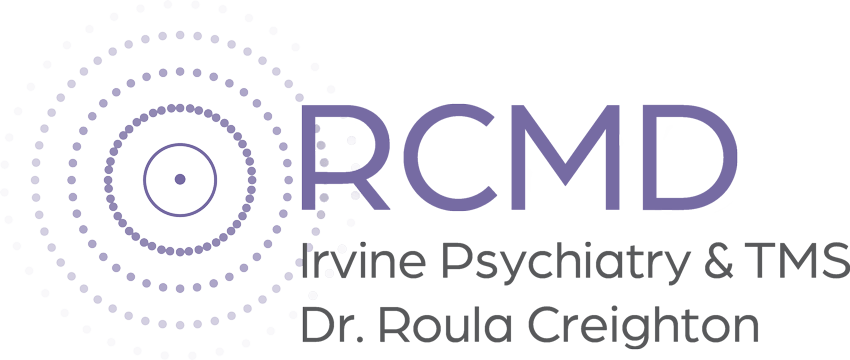Bulimia
IRVINE PSYCHIATRY AND TMS - DR. ROULA CREIGHTON
What is Bulimia?
Bulimia nervosa, often simply called bulimia, is an eating disorder characterized by binge eating followed by unhealthy methods to prevent weight gain, such as purging (vomiting, laxative abuse, diuretic abuse) or excessive exercising. People with bulimia have recurrent episodes of eating large amounts of food in a short period of time (binge eating) followed by compensatory behaviors, (purging) to prevent weight gain. They often experience a lack of control over their eating during a binge and feel guilty, ashamed or disgusted with themselves afterward. Bulimia nervosa is often associated with feelings of low self-esteem, self-worth, and difficulty expressing emotions. Bulimia can cause serious physical and psychological problems and it can be fatal if left untreated.
What are the Causes of Bulimia?
It's important to note that eating disorders are complex and multifactorial conditions, and there is likely no one cause. A combination of several factors, including psychological, biological, and environmental, are likely to play a role in its development. It's also crucial to seek professional help as soon as possible to address the disorder and its underlying causes. The exact causes of bulimia nervosa are not fully understood, but several factors likely play a role. Here are a few things that may contribute to the development of bulimia:
Psychological factors:
Bulimia nervosa is often associated with a range of psychological issues such as low self-esteem, perfectionism, and difficulty expressing emotions. Some research suggests that people with bulimia may use binge-purge behavior as a way to cope with emotional distress or to gain a sense of control over their lives.
Biological factors: Some research suggests that certain genetic and biologic factors may make some people more susceptible to developing bulimia. Studies on twins and families suggest that there may be a genetic predisposition to the disorder.
Trauma or abuse: Some studies have suggested that individuals who have a history of childhood sexual or physical abuse are at a higher risk of developing bulimia.
Psychological
Biological
Trauma
Common Treatments for Bulimia
Bulimia nervosa is a mental health disorder characterized by recurrent episodes of binge eating followed by compensatory behaviors such as purging, fasting, or excessive exercise. Common treatments for bulimia include cognitive-behavioral therapy, family-based therapy, and medication.
Cognitive-behavioral therapy (CBT) focuses on helping individuals identify and change negative thought patterns and behaviors associated with their eating disorder.
Family-based therapy (FBT) involves the family in the treatment process and focuses on restoring normal eating patterns, rather than on weight loss.
Medication such as antidepressants may be used to help reduce symptoms of anxiety and depression, which often co-occur with eating disorders.
Interpersonal therapy (IPT) can help patient to understand and manage the relationship dynamics that may be contributing to the eating disorder.
Taking Control of Bulimia
Bulimia Nervosa is a serious and complex mental health disorder that can have a significant impact on a person's physical and emotional well-being. It's important to recognize that recovery is possible with the right treatment and support. As a therapist specialized in eating disorders, we understand the importance of a personalized and holistic approach to treatment. We have the skills and experience necessary to provide you or your loved one with the support and guidance needed to overcome bulimia and achieve a healthy and fulfilling life. Our team of experts will work with you to develop an individualized treatment plan that addresses your unique needs and concerns, and we will be with you every step of the way as you work towards recovery. If you or someone you know is struggling with bulimia, please do not hesitate to reach out for help.
Explore Services
Send us a Message
Website Form
Need help?
Contact Us Today
We’d love to hear from you. Choose the most convenient method and we’ll get back to you as soon as we can within 24 hours.
CALL US TODAY:
Contact Information
PATIENT TESTIMONIALS
Read What Our Patients Are Saying About Us
William
RCMD Patient
'Anyone dealing with, or suffering from, Panic disorder will find psychological and medical expertise specific to this disorder, and would ultimately achieve improved quality of life under the care and supervision of Dr. Roula Creighton.'

Lisa
RCMD Patient
'Someone in need of psychiatric care will be very well taken care of pharmaceutically and therapy-wise with Dr. Roula Creighton. Excellent physician. She listens carefully, is involved in caring for her patients, and very professional.'

Maria
RCMD Patient
'Telehealth was extremely seamless and more comfortable than I anticipated; this platform is just fine given the situation with this pandemic and Dr. Creighton was just as caring as usual...I have no issues with the manner by which the care is delivered.'

Patient Focused Care
Please Call or email to schedule your appointment.
CALL US TODAY:


